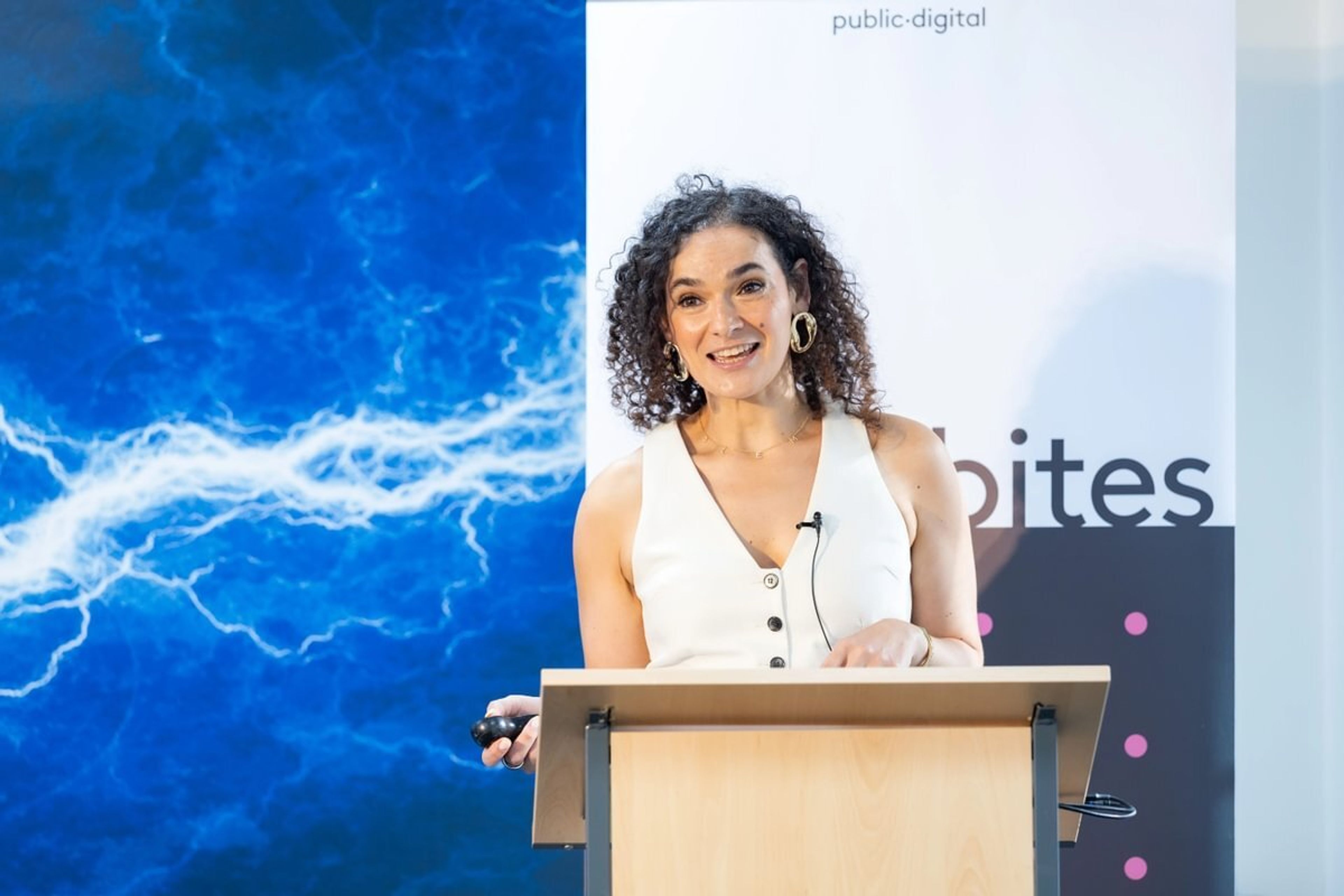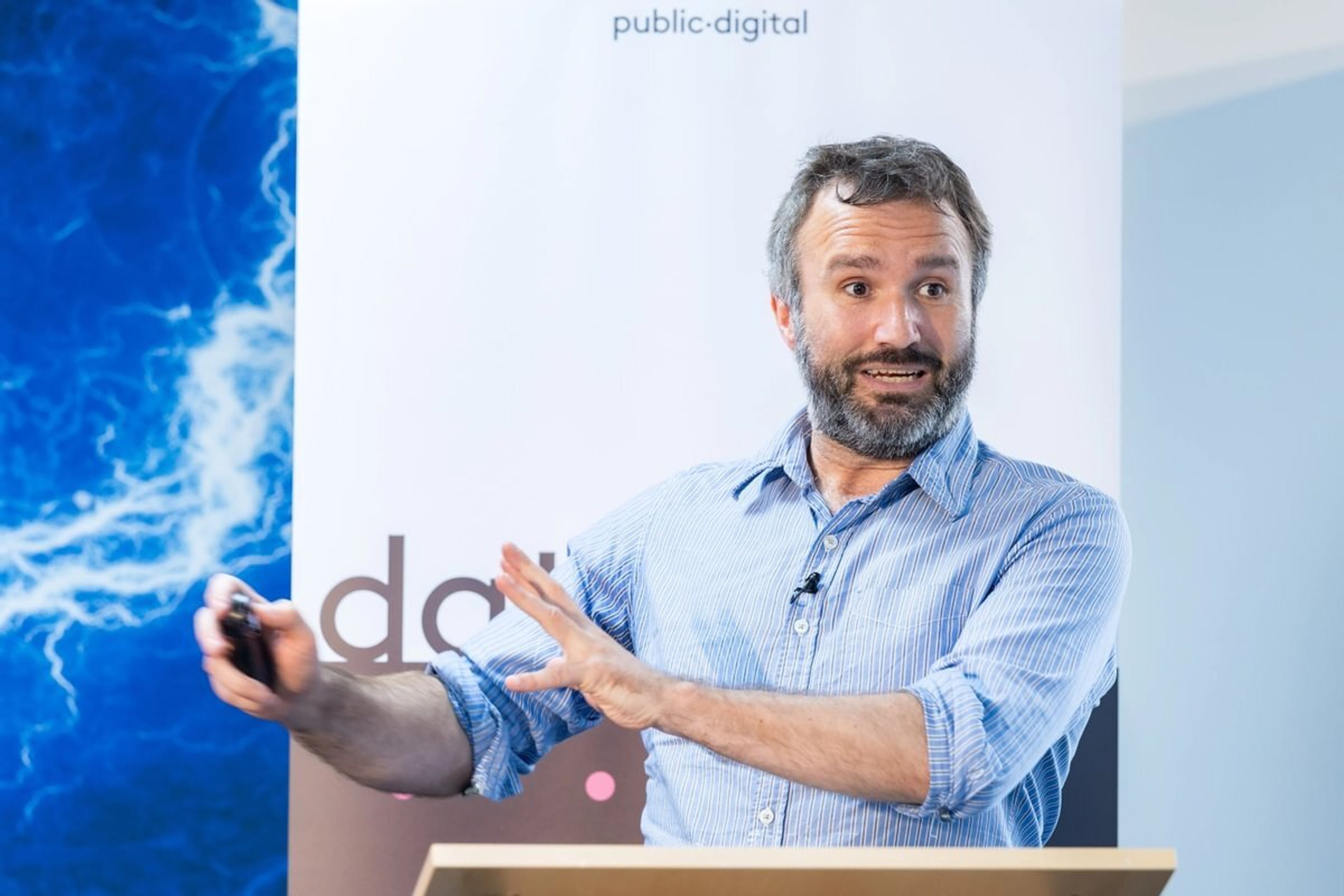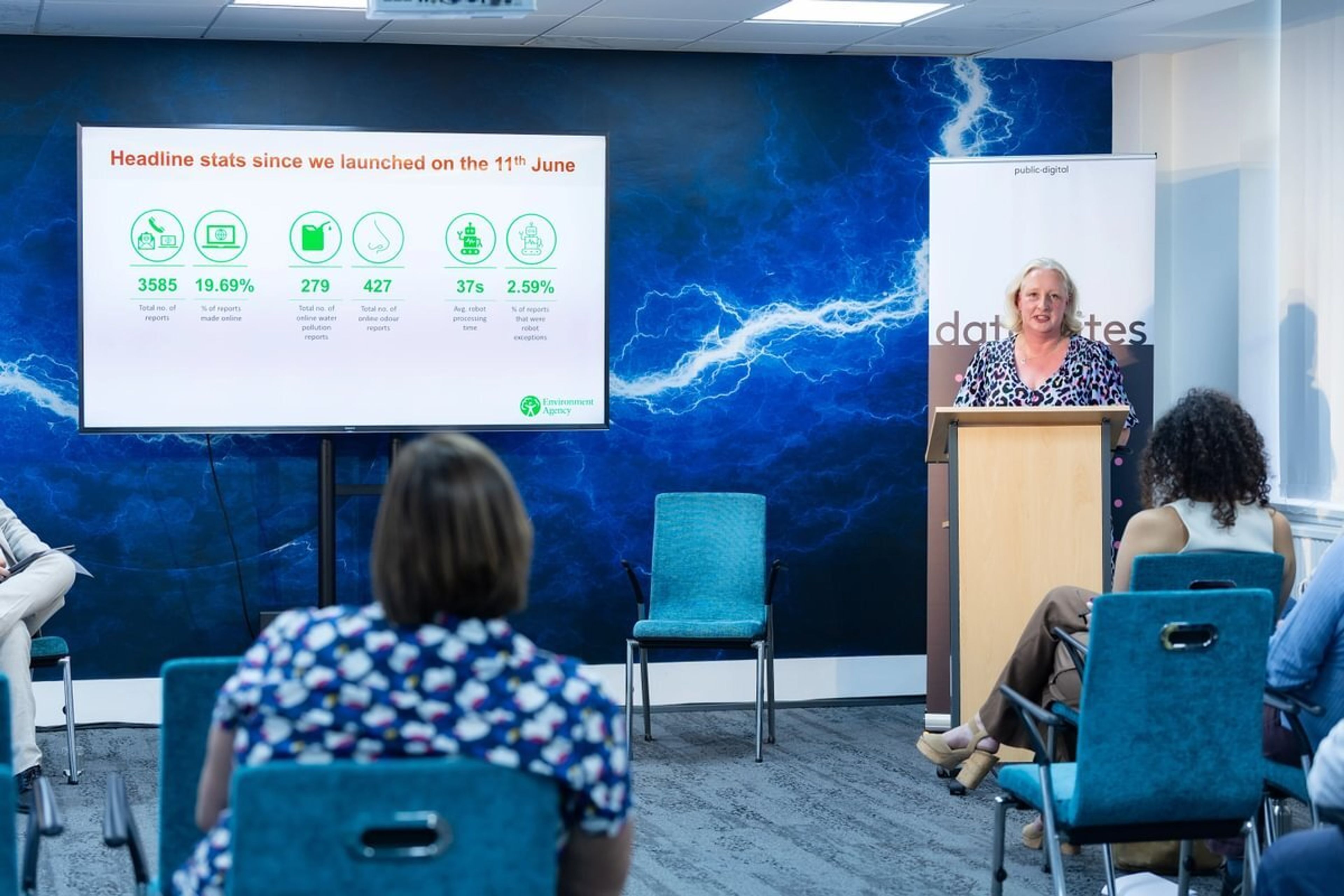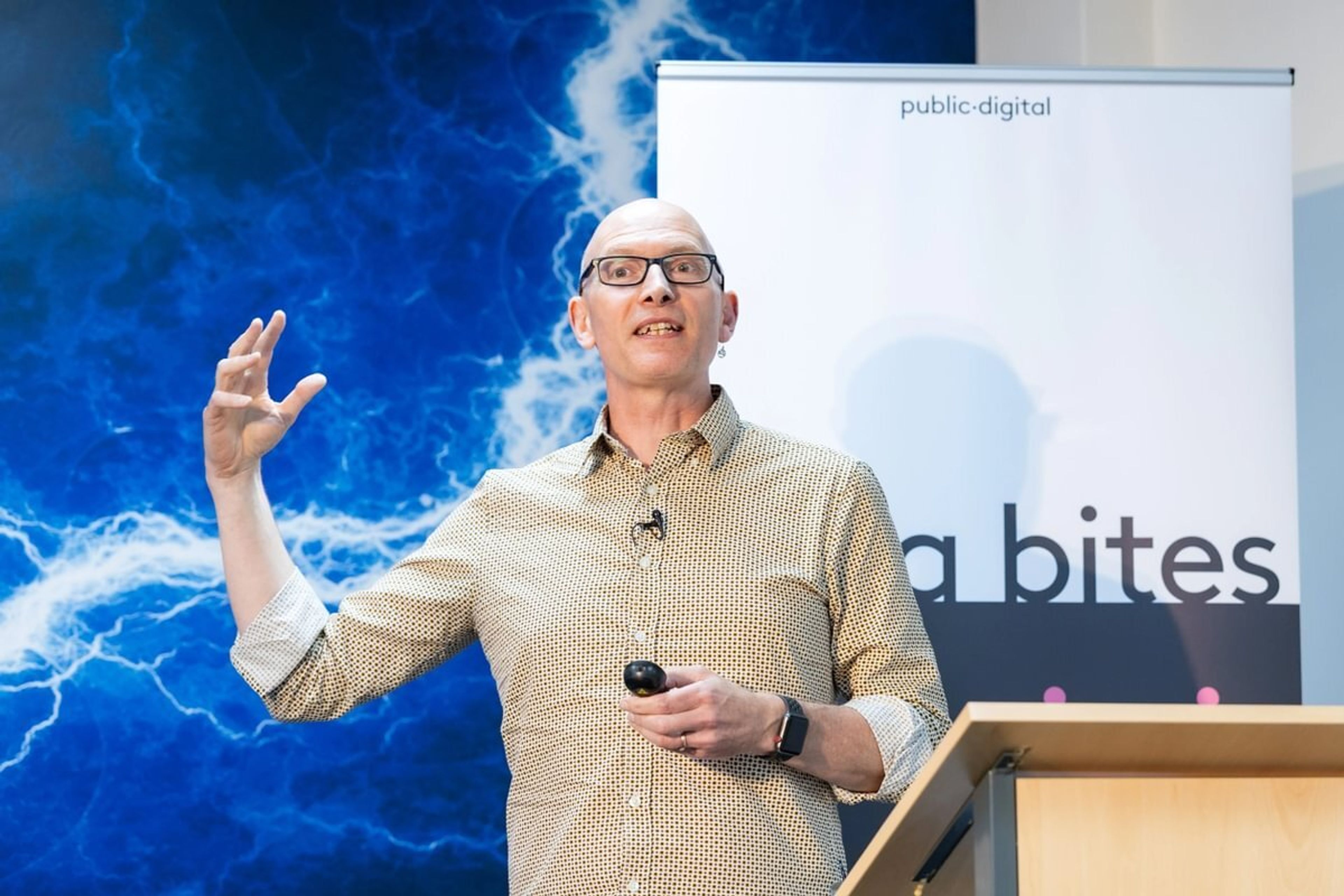Data Bites #57 - cross-government efforts in digital sustainability
July’s Data Bites was the second environment and sustainability special of the year (after Data Bites 54 in April). We heard about building a green digital service, cross-government efforts around digital sustainability, a new public service for reporting environmental incidents, and smart data schemes.
It was the eighth Data Bites hosted by Public Digital, after 49 events at the Institute for Government. If you’ve not been (or seen) before: Data Bites is a monthly event showcasing how data is used in and around the public sector. Four speakers get eight minutes to present – there are eight bits in a byte, hence eight minutes in a Data Bite – followed by eight minutes of audience questions.
We’re taking our usual break for the summer, but Data Bites will return in September.

Jennifer Marks: GOV.UK One Login – Building a Green Digital Service
Jennifer, Head of Digital Sustainability at the Government Digital Service, spoke about designing a flagship government digital service in a sustainable way, which started with understanding how to measure the service’s digital emissions. You can read more about this work in a couple of blogposts published by the OneLogin team.
Unfortunately, we are unable to bring you video or audio of Jennifer’s presentation owing to government guidance on civil servants speaking at events.

Tom Parry: Digital sustainability in UK government
Tom, Head of Digital Sustainability at the Department for Environment, Food and Rural Affairs (Defra) gave us an overview of efforts within the department and UK government more widely around digital sustainability. Tom started with some ‘scary data’ about rising global temperatures and the contribution of IT, including government IT, to emissions and waste.
More positively, government is acknowledging the importance of digital sustainability in its digital strategies and through initiatives like the greening government commitments. There is emerging best practice – for example, theGreener Service Principles – and groups like the Government Digital Sustainability Alliance.

Kate Marks: The Power of the Public – Tracking Environmental Harm in Real Time
Kate, Deputy Director, Digital Services at the Environment Agency, talked about a new digital service they’ve just launched. She kindly answered the standard set of questions we put to all of our speakers, so you can read more about the project directly from her below. You can also see her slides.
Can you summarise your project in a few sentences?
This project introduces a new digital service for reporting environmental incidents to the Environment Agency (EA). It looks to ‘channel shift’ from the current phone-only system with an accessible, online platform that allows the public to report incidents in real time, upload photos, and provide accurate location data. The service aims to improve data quality, response times, and community engagement.
What problem are you trying to solve?
The current phone-only reporting system is inaccessible to many people due to:
Poor mobile signal in rural areas
Hearing, speech, or language barriers
Limited time or ability to call during incidents.
This leads to underreporting, delayed responses, and inefficient use of EA resources.
What difference will it make to citizens? How will you know when it’s succeeded?
Easier and faster reporting of environmental harm
More inclusive access for people with disabilities or language barriers
Greater confidence that their reports are heard and acted upon
Improved environmental outcomes through quicker EA response.
What are the main hurdles?
Ensuring the service is truly accessible and user-friendly
Encouraging adoption among the public and stakeholders
Integrating the new system with existing EA workflows and data systems
Managing expectations around response times and outcomes
Aligning funding streams.
If you could change one thing about data in government, what would it be?
Can I be cheeky and say two – visibility and interoperability – I think we’d be using more of the dark data if we could see it and access it and had the permissions to use it.

Chris Pointon: Scheme scheming
Chris, Product Manager at Icebreaker One, talked about smart data schemes through an environmental lens. He also answered our standard set of questions, so we’ll hand over to Chris for more about his presentation. (You can see his slides, too, published under a CC-BY licence.)
Can you summarise your project in a few sentences?
Icebreaker One is a non-profit that has been working on data governance for over five years, convening hundreds of organisations across sectors to explore, define, design and implement the data sharing infrastructure we need to move the economy towards a more sustainable future. All our work is published openly, and we aim to use our learnings to accelerate the efforts of any organisation, regulator, government department or association that has an opportunity to put data to use to get to net zero.
What problem are you trying to solve?
Huge amounts of data are being generated worldwide: from our financial systems to energy, water, transport, our built world and our environment. As the UK Government recognises in its newly-passed Data Use and Access Act (DUAA), to make the most of its value, and reduce risks, we need to connect it with those who need it and put in place the right protections for everyone. Trusted data supports net-zero investment decisions by connecting assurable real economy and financial economy data between organisations and between sectors. But data sharing is a complex socio-technical space to operate in, with legal, regulatory and public benefit dimensions along with technical considerations. Many initiatives that build the technology and hope the rest will follow have struggled with adoption and longevity.
What difference will it make to citizens?
Smart data schemes offer the opportunity for citizens and businesses to share their data with accredited services, securely and under their control. If designed well, the schemes ensure that this shared data may only be used for specific purposes that benefit the citizens. Open Banking is an example of a scheme that already enables easy account switching, money management and fee-free payments. A smart meter scheme could lower bills and reduce emissions by shaping energy consumption, while a product information scheme could improve consumer choice by providing personalised price comparisons without identifying individuals.
How will you know when it’s succeeded?
We'll know we've succeeded when we see a Cambrian explosion of data-driven innovation accelerating decarbonisation and boosting biodiversity. New schemes (and iterations of existing schemes) will be identified, designed and implemented at scale in days or weeks, with high levels of security and watertight governance to ensure user confidence.
What are the main hurdles?
The main hurdle is the multiparty, multidimensional process of bringing a scheme from a good idea to a functioning piece of Digital Public Infrastructure. This includes: reaching clarity on the scheme's purpose; working out what is in and out of scope; establishing what the incentives are for organisations and end users to participate in it; defining what legal & procedural rules are needed; understanding what assurances are needed about data quality and processing, and how they will be monitored and audited; finally, designing how these rules can be implemented and operated at scale, while maintaining maximum compatibility with other schemes. These are all hurdles Icebreaker One has faced, occasionally tripped over, but most importantly learned from in the past five years.
If you could change one thing about data in government, what would it be?
Regarding data governance, we would love to see more ‘adopt and adapt’ rather than ‘start from scratch’. Our work has shown that processes and outcomes can be re-used for different sectors quite readily. We will achieve our public benefit goals faster, with more confidence and with a better hope of legal and technical compatibility between schemes if departments avoid an exceptionalism mindset.
Chris also shared some links:
Join the Constellation, an expert network for people working in data sharing
More on the Perseus smart meter data sharing scheme
Want to speak at a future Data Bites? Or know someone who should?
Get in touch at events@public.digital – we’re always looking for fresh voices and bold ideas.
Want to speak at a future Data Bites? Or know someone who should?
Get in touch at events@public.digital – we’re always looking for fresh voices and bold ideas.